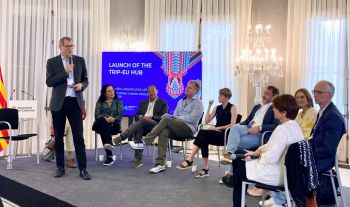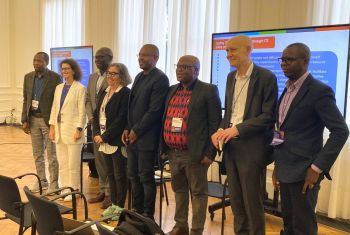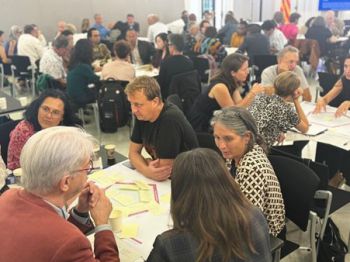Sussex rallies policy and finance leaders to tackle the world’s toughest challenges
Posted on behalf of: SPRU
Last updated: Tuesday, 8 October 2024



In a bold effort to drive meaningful change, the University of Sussex Business School gathered 150 leaders in Barcelona in September to explore collective action on societal transformations. These ‘change agents’ – including policymakers, funders, investors, scholars and intergovernmental organisations – aim to rethink how we approach the world’s most pressing issues, from climate change to housing crises.
The summit, hosted by Sussex’s Transformative Innovation Policy Consortium (TIPC) and the Deep Transitions Lab, together with Eu-SPRI and the Government of Catalonia, brought together experts from over 30 countries. Their shared goal is to find ways to transform entire systems in order to solve complex societal problems, such as deforestation, fossil fuel transitions or unemployment.
Uniting public and private forces for change
For the first time, public and private sectors teamed up in a unique way. Investors and policymakers worked side by side, identifying roadblocks, unpacking learnings and exploring fresh strategies for long-term solutions.
A key theme was the need for ‘transformative finance’ – going beyond usual investment approaches to focus on businesses that prioritise sustainability and social impact, and have broader influence at the system level.
Hans Stegeman, columnist and chief economist at Triodos Bank, explained that it’s time to move past standard impact and ‘ESG’ (Environmental, Social, Governance) models. Instead, investors need to back companies that truly drive the shift to a sustainable economy, focusing less on endless growth and more on systems transformation.
Forging new alliances between universities and society
Universities have a vital role in shaping the future, but must engage in fresh ways with citizens and public policy to enable systems change.
During the event, a new European hub for transformative innovation was launched, pairing research institutions with territorial policy partners to test real-world approaches in specific regions. This partnership will pave the way for tackling place-based challenges like urbanisation and biodiversity loss.
Scaling up learning across borders
Complex global problems require knowledge exchange and learning across regions. The event featured discussions and workshops led by intergovernmental actors, such as the OECD, UNECE, and the European Commission, to explore how countries and territories can learn from each other’s successes and failures, and what international organisations can do to help them scale actions across borders.
Victoria Shaw, TIPC Programme Director at Sussex, emphasised that real change is possible when diverse groups work together. ‘This engagement is the beginning of a community of practice that will create shared narratives and targeted investments to bring about real system change,’ she said.
Robin Banerjee, Pro-Vice-Chancellor (Global and Civic Engagement), said ’This TIPC event was a wonderful illustration of the power of partnership and collaboration. The kinds of systems transformations that are needed for tackling major global challenges require international experts from diverse sectors and areas of work to come together to share their practices, experiences, and perspectives. That is exactly what happened at the event, and the actions arising will surely be important for bringing about meaningful change on problems that have seemed so intractable.’
As the event wrapped up, finance and policy leaders from Austria, Panama, Sweden, South Africa and the UK set out new goals for addressing system change through their programmes and investments. These new alliances will continue their work through Sussex’s TIPC and the Deep Transitions Lab, with concrete actions to be rolled out in the coming work programmes.
Photos: Jessie Madrigal-Fletcher

